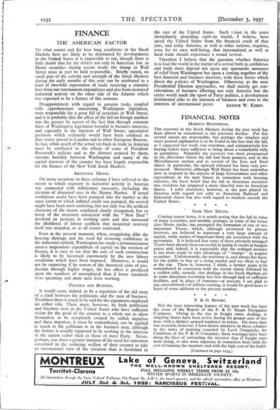FINANCE
THE AMERICAN FACTOR To what extent and for how long conditions in the Stock Markets here are likely to be dominated by developments in the United States it is impossible to say, though there is little doubt that for the debacle not only in American but in Home securities during recent weeks the slump in Wall Street must in part be held responsible. Briefly stated, no small part of the activity and strength of the Stock Markets during the early months of this year can be attributed to a kind of two-fold expectation of trade receiving a stimulus here from our rearmament expenditure and also from increased industrial activity on the other side of the Atlantic which was expected to be a feature of this autumn.
Disappointment with regard to autumn trade, coupled with apprehensions concerning Washington legislation, were responsible for a great fall of securities in Wall Street, and it is probable that the effect of the fall on foreign markets was the greater by reason of the fact that through constant fears of Washington legislation harmful to business interests, and especially to the interests of Wall Street, speculative positions which ordinarily would have been confined to that centre spread to London and to other European Bourses. In fact, while much of the actual set-back in trade in America must be attributed to the effects of some of President Roosevelt's policies and to the distrust aroused by them, extreme hostility between Washington and many of the capital interests of the country has been largely responsible for the flatness of the New York Stock Markets.
ARTIFICIAL MEANS.
On many occasions in these columns I have referred to the extent to which recovery in industrial activity in America was connected with inflationary measures, including the creation of abnormal ease in the Money Market. If actual confidence could have been pumped into the market to the same extent to which inflated credit was pumped, the revival might have been more enduring, but not only was the artificial character of the means employed clearly recognised, but so many of the measures connected with the " New Deal " involved an increase in working costs and also increased the likelihood of labour conflicts that industrial recovery itself was retarded, or at all events restricted.
Even at the present moment, when, recognising alike the housing shortage and the need for restoring confidence in the industrial outlook, Washington has made a pronouncement upon a stupendous expenditure of capital on the erection of houses, it is easy to see that the cost of such construction is likely to be increased enormously by the new labour conditions which have been imposed. Moreover, it would not be surprising if by reason of the increased costs of pro- duction through higher wages, far less effect is produced upon the numbers of unemployed than if lower standards were operating and more men were working.
POLITICS AND BUSINESS.
It would seem, indeed, to be a repetition of the old story of a clash between the politicians and the men of business. Doubtless there is much to be said for the arguments employed on either side. There must, however, be both politicians and business men in the United States who have sufficient vision for the good of the country as a whole not to allow themselves to be completely swayed by selfish impulses and these impulses, it must be remembered, can be applied as much to the politician as to the business man, *hough the former is usually supposed to be working in the interests Of the nation rather than in those of mere Party. Never, perhaps, was there a greater instance of the need for statesmen concerned in the enduring welfare of their country to take an international view of the situation than is furnished in the case of the United States. Such N ision in the years immediately preceding 1928-29 would, I believe, have saved the United States - from the financial crash of that year, and today America, as well- as other nations, requires, even for its own well-being, that. international_ as well as local trade should experience a sound revival.
Therefore I believe that the question whether America is to lead the world in the matter of a revival both in confidence and trade must depend not upon - any spasmodic measures of relief from Washington but upon a coming together of the best financial and business interests, with those forces which direct the policies of Washington. Otherwise, as the next Presidential Election approaches, we shall merely get con- siderations of business affecting not only America but the entire world made the sport of Party politics, a development detrimental alike to the interests of business and even to the


























































 Previous page
Previous page